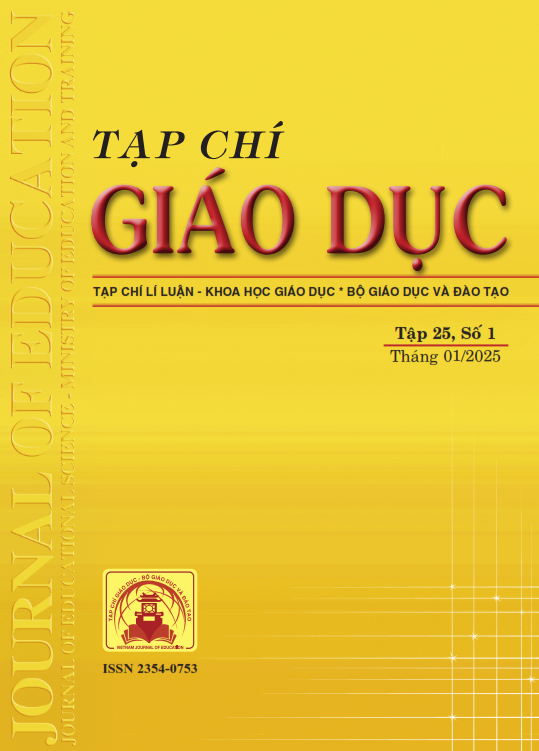Các quan điểm tiếp cận mô hình hóa toán học và khả năng vận dụng vào thực tiễn dạy học toán ở Việt Nam
- Từ khóa:
- Mathematical modeling
- competence
- student
- Vietnam
Tóm tắt
Research on mathematical modeling has been gaining traction in many countries, including Vietnam, evidenced by the increasing number of relevant books and articles. Moreover, these publications reveal various approaches to mathematical modeling and its relevant concepts. The diversity of perspectives on mathematical modeling in mathematics education is reflected in the existence of multiple definitions of mathematical modeling, various proposed modeling cycles, and extensive discussions on the nature of questions used in teaching modeling. These variations pose significant challenges to the implementation of mathematical modeling instruction in schools. Through the method of analysis and synthesis of relevant literature, this study explores several approaches to teaching mathematical modeling in mathematics education, with particular emphasis on clarifying two perspectives: viewing mathematical modeling as a tool for teaching mathematics and as a goal of mathematics instruction. The study also offers recommendations for the application of mathematical modeling in teaching mathematics at the secondary school level in Vietnam.
Tài liệu tham khảo
Abassian, A., Safi, F., Bush, S., & Bostic, J. (2020). Five different perspectives on mathematical modeling in mathematics education. Investigations in Mathematics Learning, 12(1), 53-65.
Alridha-Jilawi,.A S., & Abd Alsharify, F. H. (2022). Review of mathematical modelling techniques with applications in biosciences. Iraqi Journal For Computer Science and Mathematics, 3(1), 135-144.
Barbosa, J. C. (2009). Mathematical modelling, the socio-critical perspective and the reflexive discussions. Mathematical applications and modelling in the teaching and learning of mathematics, 133-144.
Blum, W. (2011). Can modelling be taught and learnt? Some answers from empirical research. In G. Kaiser, W. Blum, R. Borromeo Ferri, & G. Stillman (Eds.), Trends in the teaching and learning of mathematical modelling - Proceedings of ICTMA14 (pp. 15-30). New York: Springer.
Cevikbas, M., Kaiser, G., & Schukajlow, S. (2022). A systematic literature review of the current discussion on mathematical modelling competencies: State-of-the-art developments in conceptualizing, measuring, and fostering. Educational Studies in Mathematics, 109(2), 205-236.
Chan, E. C. M. (2008). Using model-eliciting activities for primary mathematics classrooms. The Mathematics Educator.
Erbas, A. K., Kertil, M., Çetinkaya, B., Cakiroglu, E., Alacaci, C., & Bas, S. (2014). Mathematical modeling in mathematics education: basic concepts and approaches. Educational Sciences: Theory and Practice, 14(4), 1621-1627.
Garfunkel, S., & Montgomery, M. (Eds.). (2019). GAIMME-Guidelines for Assessment & Instruction in Mathematical Modeling Education. Society for Industrial and Applied Mathematics.
Gutiérrez, J. A., & Gallegos, R. R. (2019). Mathematical modeling in the educational field: a systematic literature review. In Proceedings of the Seventh International Conference on Technological Ecosystems for Enhancing Multiculturality (pp. 718-725).
Hidayat & Iksan (2018). Mathematical modelling competency for Indonesian students in mathematics education programmes. Creative Education, 9(15), 2483-2490.
Hidayat, R., Adnan, M., Abdullah, M. F. N. L., & Safrudiannur (2022). A systematic literature review of measurement of mathematical modeling in mathematics education context. Eurasia Journal of Mathematics, Science and Technology Education, 18(5), em2108. https://doi.org/10.29333/ejmste/12007
Kaiser, G., & Sriraman, B. (2006). A global survey of international perspectives on modelling in mathematics education. Zdm, 38, 302-310.
Kaiser, G., Sriraman, B., Blomhøj, M., & Garcia, F. J. (2007). Report from the working group modelling and applications-Differentiating perspectives and delineating commonalties. In Proceedings of the fifth congress of the European society for research in mathematics education (pp. 2035-2041). Nicosia, Republic of Cyprus: University of Cyprus.
Kutluca, T., & Kaya, D. (2023). Mathematical modelling: A retrospective overview. Journal of Computer and Education Research, 11(21), 240-274.
Lesh, R., & Harel, G. (2003). Problem solving, modeling, and local conceptual development. Mathematical thinking and learning, 5(2-3), 157-189.
Niss, Blum & Galbraith (2007). Introduction. In W. Blum et al. (Eds.), Modelling and applications in mathematics education, The 14th ICMI Study (pp. 161-170). Springer.
Skovsmose, O., & Borba, M. (2004). Research methodology and critical mathematics education. In Researching the socio-political dimensions of mathematics education: Issues of power in theory and methodology (pp. 207-226). Boston, MA: Springer US.
Stillman, G., Galbraith, P., Brown, J., & Edwards, I. (2007). A framework for success in implementing mathematical modelling in the secondary classroom. Mathematics: Essential Research, Essential Practice, 2(1), 688-697.
Zbiek, R. M., & Conner, A. (2006). Beyond motivation: Exploring mathematical modeling as a context for deepening students' understandings of curricular mathematics. Educational Studies in Mathematics, 63, 89-112.
Tải xuống
Đã Xuất bản
Cách trích dẫn
Số
Chuyên mục
Giấy phép

Tác phẩm này được cấp phép theo Ghi nhận tác giả của Creative Commons Giấy phép quốc tế 4.0 .












